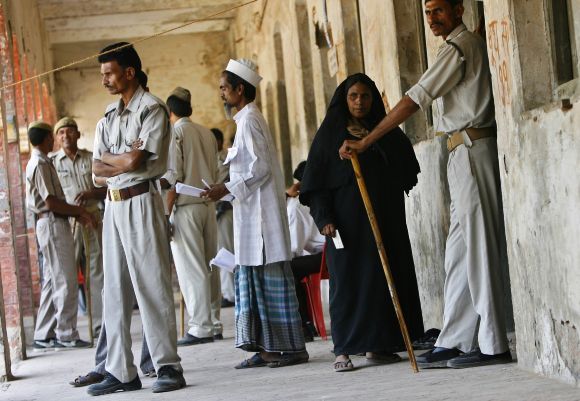'Politicians insist on focusing on the North even though the rest of India offers a better way of engaging with our Muslims namely, live and let live,' argues T C A Srinivasa-Raghavan.

In 1947, the British freed us from their rule. Amidst violent Hindu-Muslim riots, they also freed some Muslim Indians from the fear of Hindu majority rule by giving them Pakistan.
Pakistan has moved on since then. Seventy years later, however, we in India are still angsting over Hindu-Muslim relations.
But as Tonto famously asked the Lone Ranger 'We, Paleface? who are this 'we' of India who continually angst over Hindu-Muslim relations?
As a Tamil who has lived for 60 years in Delhi, let me say it plainly.
The Hindu-Muslim 'narrative' of the 29 states that make up our otherwise lovely country has been captured by just three states -- Kashmir, Punjab and UP.
Their experience has become our national experience.
Thus, Kashmir determines the degree of jingoism.
Punjab determines the extent of tearfulness.
And UP determines the extent of divisiveness in Indian politics.
If you are a painful little pedant, you will point to Maharashtra or Gujarat, where they turn a very useful Hindu-Muslim trick politically.
And now Bengal is also trying something similar by importing the very Muslims who had chosen to leave Hindu-majority India.
But that is about all.
In the rest of the Indian states -- including indeed in many of the North Indian ones -- the Hindu-Muslim thing is done differently.
Not that the Hindus actually love the Muslims there; nor do the Muslims love the Hindus.
They mostly ignore each other so that they can live together peacefully.
Not acknowledging each other is thus an important contributor to communal peace. But the fake jhappi-pappi culture of Punjab and UP is totally absent there.
There are at least two reasons for this dichotomy which I think we must acknowledge.
One reason is very old, and the other one is very new.
The old reason is the way Islam came to North India through Punjab and expanded via UP.
The sword was the primary instrument of expansion.
The North Indian experience was thus of a violent Islam, what it called the Turki variety.
That violence is the dominant memory in much of North India.
In the rest of India -- and in the South particularly -- Islam came via trade, not the sword.
There the memories are different.
The two communities despise each other, but 'no hate please, we are not from the North'.
Sadly, it seems the absence of hate has no political or social value.
Politicians insist on focusing on the North even though the rest of India offers a better way of engaging with our Muslims namely, live and let live.
The new reason is what happened after Partition.
In Punjab and Bengal most Muslims went off to Pakistan, east and west.
But in UP only the rich fellows departed. The rest stayed on saying, quite rightly, this land is my land.
Except, hang on: It is not just in UP that they stayed on.
They stayed on in the other states too. Don’t ever forget this.
So Partition, in my North Indian Tamil perspective, was more a Punjabi-Bengali thing than a Muslim-only thing.
And -- please don't interrupt -- had it been a purely Muslim thing, East Pakistan would not have chosen to break up with the West.
Religion proved a poor adhesive. Islam played a role in defining the political identity, but it could not join the two cultural identities.
Whence my Tamil question: Why does what happens in UP dominate the whole 'narrative'?
In fact, not even the whole of UP, just western UP?
Are the rest of us idiots or what?
Is it not extraordinary that 70 years after Independence, we have replaced one political party, the Congress, by another that is exactly like it, namely the BJP?
The politics of both is thus determined by their attitude to India's Muslim citizens. How Mohammad Ali Jinnah would have loved this outcome.
It is not important that one loves them and the other hates them. That is banal.
What is important is that both need them, and exploit them in a way that pisses off the Hindus.
In North India the Congress panders, the BJP persecutes.
This is not the case in the rest of India.
There the very same parties don't stir the anti-Muslim pot all the time.
The result is a completely different flavour of Hindu-Muslim relations, of mutual contempt, and benign neglect by each of the other.
IMAGE: A Muslim woman waits to cast her vote at a polling station in Varanasi. Photographs: Adnan Abidi/Reuters












 © 2025
© 2025